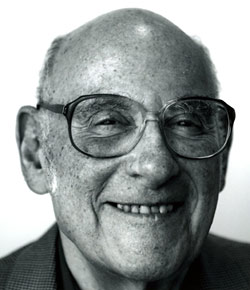Political scientist Harold Wilensky dies at age 88
Harold L. Wilensky, professor emeritus of political science at the University of California, Berkeley, died at his Berkeley, Calif., home on Sunday, Oct. 30, after a long battle with prostate cancer. He was 88.
November 1, 2011
Harold L. Wilensky, professor emeritus of political science at the University of California, Berkeley, died at his Berkeley, Calif., home on Sunday, Oct. 30, after a long battle with prostate cancer. He was 88.
Wilensky made major contributions to understanding the impact of industrial transformation on the structure, culture and politics of modern society. He was a pioneer in the study of the welfare state and social policy, the intellectual life of labor unions and the structural and ideological roots of intelligence failures in government and industry.
“Harold Wilensky was one of the great interdisciplinary social scientists of his generation,” said Lowell Turner, professor of international and comparative labor at Cornell University. “His uncompromising analysis showed what works best for countries at similar levels of economic development and why.”

Harold Wilensky
Longtime UC Berkeley colleague and University professor emeritus of sociology Neil Smelser said that Wilenskey “sought to chart a more inclusive, socially just course for U.S. policy makers. In his view, the United States does not have to sacrifice prosperity and employment in order to be more inclusive and egalitarian. On the contrary, the United States could improve its economic performance if policy makers pursued a more progressive agenda.”
Born in New Rochelle, New York, on March 3, 1923, Wilensky was reared in a liberal family, and that orientation remained with him. His undergraduate years (1942 and 1945-47) were spent at Antioch College, where he worked in and around the labor movement and the Democratic Party. He served as Midwest field director for the Voters Research Institute, then as research assistant at the Detroit headquarters of the United Auto Workers, then as assistant to the chief lobbyist at the Ohio C.I.O. Council, and later for three years at the University of Chicago Union Leadership Project.
His schooling was interrupted by a term of service in the U.S. Air Force. He narrowly missed being assigned to the European Theater as one of the Air Force’s bomber pilots, who had a survival rate of one in three.
Throughout his 60 years of scholarship in the social sciences, Wilensky remained fair and sensible politically, his colleagues said. His academic career included 28 years in the sociology departments at the University of Michigan and UC Berkeley, and in the political science department at UC Berkeley from 1982 until his retirement in 1991.
Wilensky produced 75 articles and 13 books that colleagues described as interdisciplinary, innovative, rigorous, substantively rich,and focused on important real-world issues.
Among Wilensky’s books were “Industrial Society and Social Welfare” (1958), “The Welfare State and Equality” (1975), “Intellectuals in Labor Unions” (1956), and the prize-winning book “Organizational Intelligence” (1967).
In “Rich Democracies” (2002), Wilensky offered a powerful rebuttal to those who argue that more taxing and spending undermines economic performance, based on research on 19 countries over 50 years. Instead, he found that the high tax/spend countries achieve far better social performance and equal or better economic performance.
Wilensky lost his home in the Berkeley-Oakland Hills fire of 1991, along with a vast collection of primary materials for “Rich Democracies” and drafts of the manuscript. He wrote to innumerable colleagues to retrieve parts of the book that he had circulated for comments, and building from that base, he finished the book at age 79.
At the time of his death, Wilensky had completed “American Political Economy in Global Perspective,” a book to be published in 2012, and had sent the final page proofs to Cambridge University Press nine days before his death. In this book, which concluded Wilensky’s 40-year project on the comparative political economy of advanced industrial countries, he devoted special attention to the past 15 years of crisis and to contemporary American policies and politics.
Wilensky taught a wide range of courses on comparative political economy; the sociology of work, leisure and mass communications; knowledge and intellectuals; complex organizations; the welfare state and public policy. His former graduate students include many prominent figures today in the fields of sociology and political science.
“I knew him as a mentor with high standards and a huge heart,” said Kathleen Thelen, a professor of political science at the Massachusetts Institute of Technology who was a student of Wilensky’s.
Wilensky was a fellow of the American Academy of Arts and Sciences and was twice a fellow at the Center for Advanced Study in the Behavioral Sciences.
He was also a fine athlete. He skied until he was 83, and at one point he won a bronze in a Nastar slalom race. He was a lifelong lover of music, especially jazz, and played the trumpet and the piano. His son Dan Wilensky is a professional saxophonist.
Harold Wilensky is survived by his partner of 32 years, Mary Roth Sharman; his sons, Stephen David Wilensky of Glencoe, Calif.; Michael Alan Wilensky of Piedmont, Calif.; Daniel Lewis Wilensky of Atlantic Highlands, New Jersey; and four granddaughters.
The family requests that memorial donations go to the UC Berkeley’s Cal Performances, the Library Fund, or to a unit on campus of the donor’s choosing. For Cal Performanances donations, contact the Friends of Cal Performances Info Line at (510) 643-8783, [email protected] or visit the CalPerformances website. For more information about the Library Fund, contact the Library Development Office at131 Doe Library, UC Berkeley, Berkeley, CA 94720-6000, http://givetocal.berkeley.edu/browse/?u=75 or (510) 642-9377.